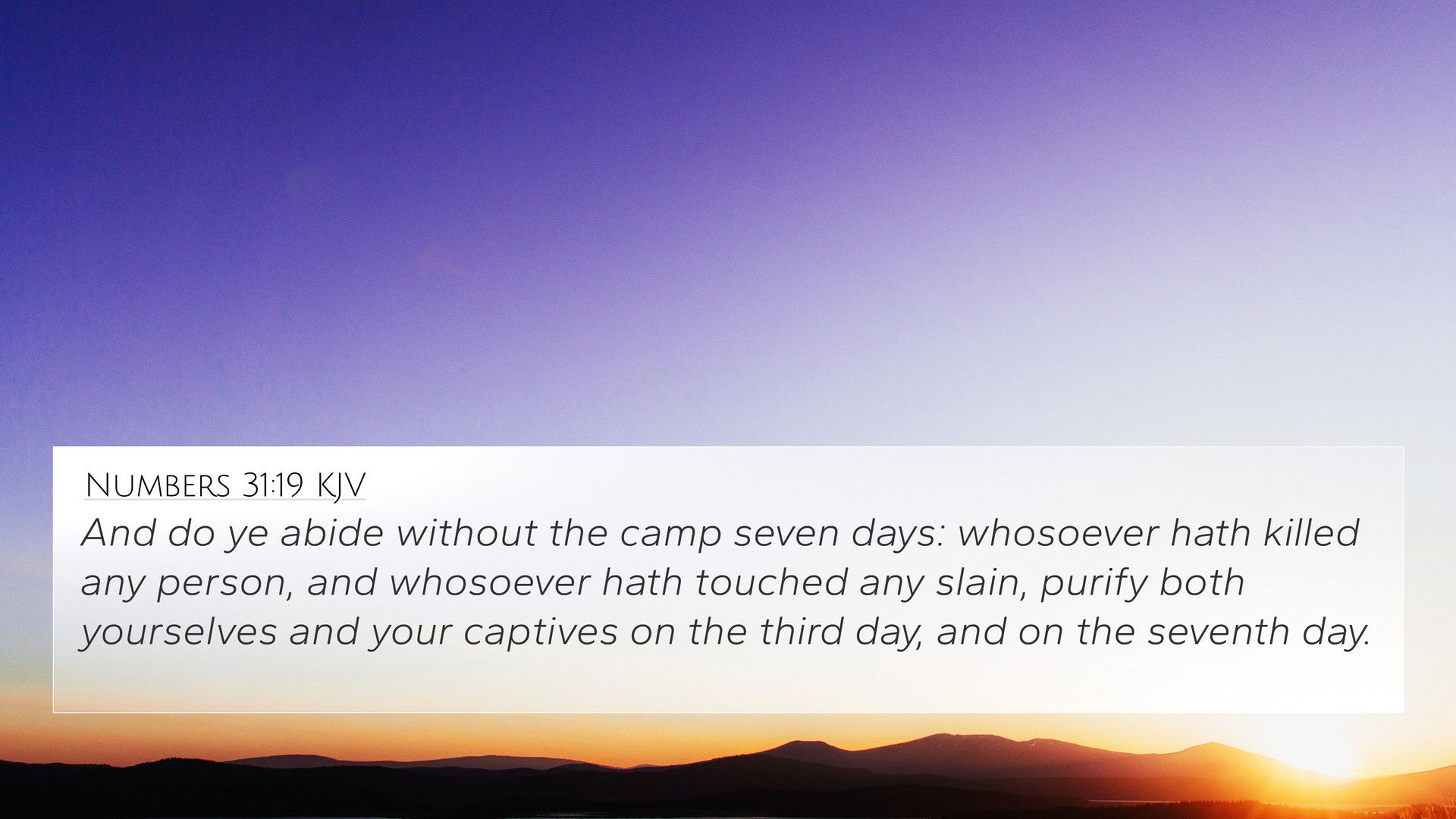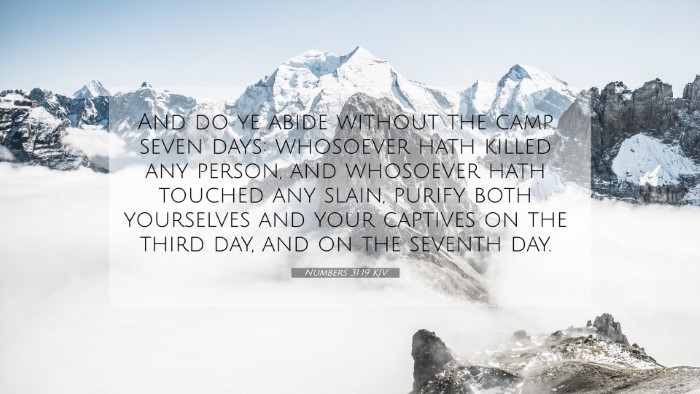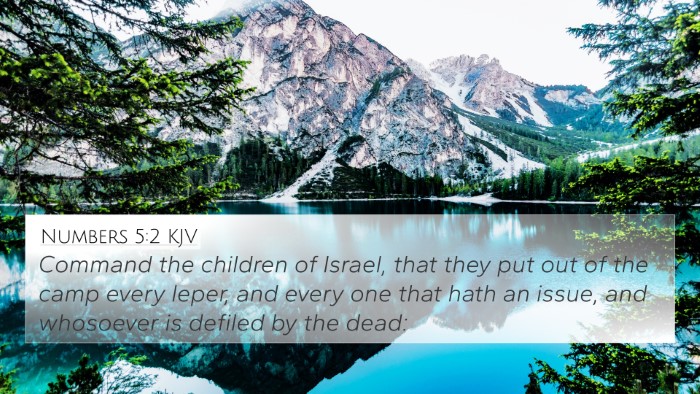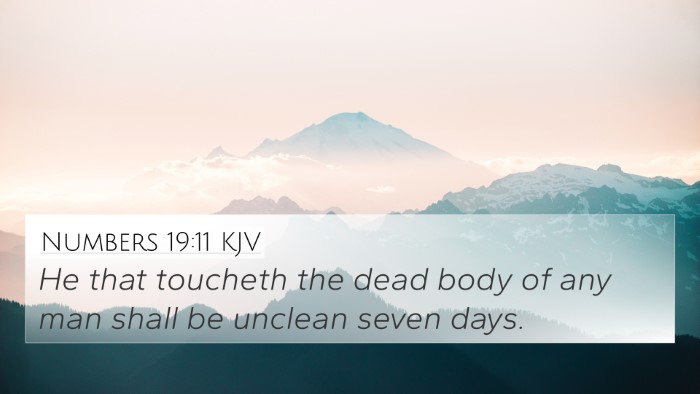Understanding Numbers 31:19
Verse Reference: Numbers 31:19
Verse Text: "And do ye abide without the camp seven days: whosoever hath killed any person, and whosoever hath touched any slain, purify yourselves and your captives on the third day and on the seventh day."
Summary of Meaning
This verse gives instructions from God to the Israelites following their battle against the Midianites. It emphasizes the need for purification after engaging in battle where bloodshed occurs. The command to remain outside the camp for seven days underscores the seriousness of ritual impurity associated with death and the necessary steps to restore spiritual cleanliness.
Insights from Public Domain Commentaries
Matthew Henry's Commentary
Henry highlights that Israel's warfare was not just a physical conflict but also a spiritual undertaking. He explains that the commands on purification reflect the holiness required of God's people. The imposed waiting period serves to show the gravity of violence and death, drawing a clear line on communal and personal purity.
Albert Barnes' Commentary
Barnes notes the importance of maintaining ceremonial cleanliness. The seven days outside the camp allowed individuals to properly purify themselves, emphasizing that God desires a holy people. Moreover, the instruction was practical, as it ensured that any infectious behaviors arising from acts of violence were curtailed within the community.
Adam Clarke's Commentary
Clarke provides a detailed explanation of the purification process. He emphasizes that the number seven is significant in Jewish tradition, often representing completeness and divine order. The mention of the third and seventh days for purification rituals shows a structured approach that was rooted in both practical hygiene and spiritual obedience.
Connections to Other Bible Verses
This verse connects to several other scriptures that outline themes of purification, holiness, and the consequences of sin:
- Leviticus 11:24-25: Discusses bodily discharges and how to be clean.
- Numbers 19:11-12: Specifies laws regarding touching a dead body.
- Hebrews 9:22: Reminds that without the shedding of blood is no remission of sins, linking the themes of death and purification.
- James 4:8: Calls for spiritual purification, resonating with the principles of sanctification.
- 1 John 1:9: Emphasizes the need for confession and cleansing from sin.
- Mark 7:15: Jesus teaches about what truly defiles a person, looking beyond the ceremonial laws.
- 2 Corinthians 7:1: Encourages believers to cleanse themselves from every defilement.
- Psalm 119:9: Asks how one can keep his way pure through adherence to the Word of God.
- Exodus 19:10: Another instance of God commanding the people to prepare themselves for an encounter with Him.
- Ephesians 5:25-27: Discusses Christ’s love for the church and how He sanctified it through His blood.
Understanding Ritual Purification in Numbers 31:19
In understanding this verse, we see the profound emphasis God places on purification before re-entering the community of faith. This necessity calls believers today to reflect on their own spiritual cleanliness and to seek out purifying practices—whether through confession, community, or worship—to ensure they uphold a standard of holiness before God.
Applications of Numbers 31:19 Today
The principles behind Numbers 31:19 also hold significant relevance for contemporary Christians:
- Recognize the weight of sin and its impact on community: Just as ritual impurity could affect the Israelites, so too can sin affect a church community today.
- Prioritize spiritual health: Engage regularly in practices that promote spiritual cleansing, such as prayer, reading Scripture, and seeking God's forgiveness.
- Embrace accountability: Just as the Israelites were to help each other through purification, modern believers benefit from community support in their spiritual journeys.
- Understand the importance of humility: The Israelites' waiting and purification highlighted the need for humility before God.
Conclusion
The instructions given in Numbers 31:19 carry enduring lessons on the nature of holiness, the responsibility of believers to maintain purity, and the communal aspect of faith. By reflecting on this scripture and its related verses, one can appreciate the depths of God's call to holiness throughout both the Old and New Testaments.





